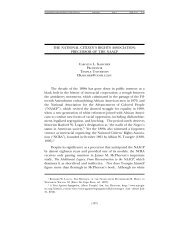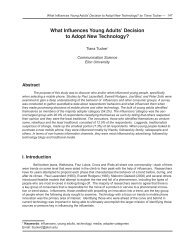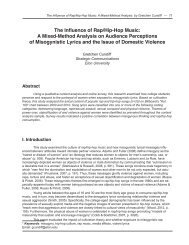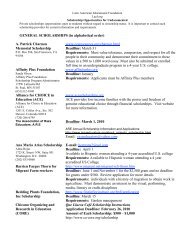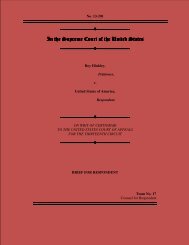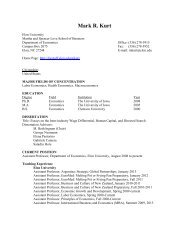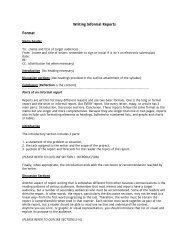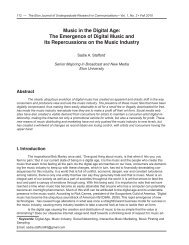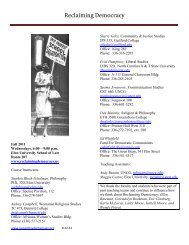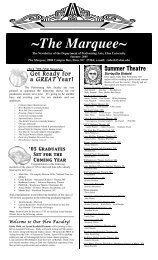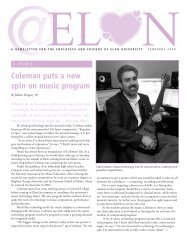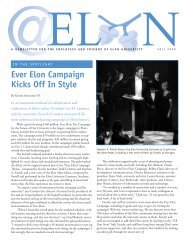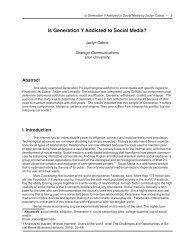The Effect of Personality Styles (Level of ... - Elon University
The Effect of Personality Styles (Level of ... - Elon University
The Effect of Personality Styles (Level of ... - Elon University
You also want an ePaper? Increase the reach of your titles
YUMPU automatically turns print PDFs into web optimized ePapers that Google loves.
70 — <strong>The</strong> <strong>Elon</strong> Journal <strong>of</strong> Undergraduate Research in Communications • Vol. 1, No. 2 • Fall 2010<br />
Abstract<br />
<strong>The</strong> <strong>Effect</strong> <strong>of</strong> <strong>Personality</strong> <strong>Styles</strong><br />
(<strong>Level</strong> <strong>of</strong> Introversion- Extroversion)<br />
on Social Media Use<br />
Erin Ryan Harbaugh*<br />
Strategic Communications & Psychology : Double Major<br />
<strong>Elon</strong> <strong>University</strong><br />
This research paper details a study <strong>of</strong> social network users personality style and their consequent<br />
social media use on the popular social networking site (SNS), Facebook. <strong>The</strong> self-reported level <strong>of</strong> extroversion<br />
amongst other personality traits served as the central delineation <strong>of</strong> personality style. <strong>The</strong> amount <strong>of</strong><br />
social media usage was determined based on basic behaviors and motivations for using the site (e.g., time<br />
spent, purpose, etc.). <strong>The</strong> objective <strong>of</strong> this study was to determine if and how a relationship existed between<br />
Facebook use and personality type in that one personality type would use Facebook more <strong>of</strong>ten and for different<br />
reasons than the other, unrepresented personality type. <strong>The</strong> results indicated that heavy Facebook users,<br />
who spend more than two hours daily on the site, are seen by themselves and others as more outgoing and<br />
extroverted.<br />
I. Introduction<br />
<strong>The</strong> conceptualization <strong>of</strong> the Internet has been undeniable, affecting the way millions <strong>of</strong> people<br />
today communicate, interact and gather information. 1 People use the Internet to “send e-mail, check news,<br />
research, play games, download music or movies, keep in touch with family and friends, seek similar others,<br />
buy products, and engage in numerous other activities.” 2 Additionally, the Internet is used to conduct business,<br />
keep in touch with family and friends, seek emotional support, and search for romantic partners. 3 <strong>The</strong><br />
Internet we know today has come about not in the form <strong>of</strong> a replacement for the real world, but rather as a<br />
part <strong>of</strong> it in our present society, and this is just the beginning. <strong>The</strong> ability <strong>of</strong> the Internet to touch almost every<br />
aspect <strong>of</strong> our life is likely to increase over the next few years. 4 This gives the Internet a great influence over<br />
the ability it has to shape our lives, now and for generations to come.<br />
* Keywords: Social Networking Sites, Social Media Use, <strong>Personality</strong> style: introversion/ extroversion, Behaviors/<br />
motivations for Social Networking<br />
Email: eharbaugh@elon.edu / erin.r.harbaugh@gmail.com<br />
1 Tel Amiel and Stephanie Lee Sargent, “Individual Differences in Internet Usage Motives,” Computers in Human<br />
Behavior 20 (2004): 712.<br />
2 Vikanda Pornsakulvanich and Paul M. Haridakis, “<strong>The</strong> Influence <strong>of</strong> Dispositions and Internet-use Motivation<br />
on Online Communication Satisfaction and Relationship Closeness,” (Paper presented at the annual meeting<br />
<strong>of</strong> the NCA 93rd Annual Convention, Chicago, IL, January 24, 2010), 2.<br />
3 Ibid.<br />
4 Hamburger, “Internet and <strong>Personality</strong>,” 2.
<strong>Personality</strong> <strong>Styles</strong> <strong>Effect</strong> on Social Media Use by Erin Harbaugh — 71<br />
With the advent <strong>of</strong> a new form <strong>of</strong> communication comes both positive and negative feedback. <strong>The</strong><br />
Internet has been said to have created a new, different approach towards interpersonal interaction improving<br />
individuals’ lives, while it has also been said to have eroded psychological well-being (by increasing loneliness<br />
and depression), weaken real-world ties and reduce any sense <strong>of</strong> community involvement. 5 No matter<br />
how important the advantages or disadvantages <strong>of</strong> this new form <strong>of</strong> communication, it is still a fact that 80<br />
percent <strong>of</strong> U.S. adults go online, whether at home, work or elsewhere. 6 <strong>The</strong>re are different types <strong>of</strong> Internet<br />
use, including non-interpersonal communication use (e.g., entertainment) and interpersonal communication<br />
use (e.g., email and social media use). Of those Internet users, the average user spends 13 hours per week<br />
online. 7 Of these 13 hours, the average user around the world spent more than five and a half hours on social<br />
networks in December 2009, up 200 percent from the same month in 2008. 8<br />
Social networks are defined as “web-based services that allow individuals to (1) construct a public or<br />
semi-public pr<strong>of</strong>ile within a bounded system, (2) articulate a list <strong>of</strong> other users with whom they share a connection,<br />
and (3) view and traverse their list <strong>of</strong> connections and those made by others within the system.” 9<br />
Social networks <strong>of</strong>fer users to become part <strong>of</strong> a network <strong>of</strong> online friends that allows them to keep in touch<br />
with current friends, reconnect with old friends and/or create real–life friendships by joining groups/ forums <strong>of</strong><br />
those who share similar interests. 10 Additionally, some social network sites (SNS) <strong>of</strong>fer users the opportunities<br />
to find a job or establish business contacts. 11 Most SNS also <strong>of</strong>fer further features. In addition to blogs and forums,<br />
users can express themselves by designing their pr<strong>of</strong>ile page to reflect their individual personality. 12 For<br />
these reasons and more, 110 million Americans, or 60 percent <strong>of</strong> the online population, use social networks. 13<br />
Among all sites and applications on the Internet, social networks and blogs proved to be the most popular,<br />
followed by online games and instant messaging. 14 <strong>The</strong> average social networker visits a social site five days<br />
a week and checks in about four times daily for a total <strong>of</strong> an hour each day. 15<br />
“Boasting 206.9 million users in December, 2009 [now more than 400 million as <strong>of</strong> April, 2010], Facebook<br />
was the top SNS, according to Nielsen Media Research, grabbing 67 percent <strong>of</strong> social networking users<br />
throughout the world,” according to Lance Whitney. 16 Founded in 2004, Facebook is a social networking site<br />
(SNS), which provides users with a platform to create a personal pr<strong>of</strong>ile page, add ‘friends’, and send messages.<br />
“<strong>The</strong> average Facebook user is more likely to be married (40 percent), Caucasian (80 percent) and<br />
retired (6 percent) than users <strong>of</strong> the other social networks. <strong>The</strong>y have the second-highest average income <strong>of</strong><br />
other SNS, at $61,000, and an average <strong>of</strong> 121-130 connections.” 17<br />
One statistic that is left out here is the average Facebook user’s personality style and consequent<br />
motivation for choosing to communicate in this way and on this particular SNS, Facebook, specifically. Not<br />
much research has been conducted in this area. <strong>The</strong> little that has proved inconsequential evidence or evidence<br />
that includes other extraneous variables. <strong>The</strong> current researcher is interested in answering the following<br />
questions:<br />
5 Ibid.<br />
6 Lance Whitney, “Average Net User Now Online 13 Hours Per Week,” Cnet news Online, December 23,<br />
2009, http://news.cnet.com/8301-1023_3-10421016-93.html (February 28, 2010).<br />
7 Whitney, “Average Net User Now Online 13 Hours Per Week.”<br />
8 Lance Whitney, “Twitter, Facebook Use Up 82 Percent,” Cnet news Online, February 22, 2010, http://news.<br />
cnet.com/8301-1023_3-10457480-93.html?tag=mncol;posts (February 28, 2010).<br />
9 danah m. boyd and Nicole B. Ellison, “Social Network Sites: Definition, History, and Scholarship.” Journal <strong>of</strong><br />
Computer-Mediated Communication 13 (2007).<br />
10 “Social Networking Websites Review,” Top Ten Reviews, http://social-networking-websites-review.toptenreviews.com/<br />
(March 20, 2010).<br />
11 Ibid.<br />
12 Ibid.<br />
13 “What Social Networks Reveal About the User,” Advertising Age, July 8, 2009, http://www.lookingfit.com/<br />
articles/what-social-networks-reveal-about-the-user.html (March 29, 2010).<br />
14 Whitney, “Twitter, Facebook Use Up 82 Percent.”<br />
15 “What Social Networks Reveal About the User.”<br />
16 Whitney, “Twitter, Facebook Use Up 82 Percent.”<br />
17 What Social Networks Reveal About the User.”; “Facebook Statistics.”
72 — <strong>The</strong> <strong>Elon</strong> Journal <strong>of</strong> Undergraduate Research in Communications • Vol. 1, No. 2 • Fall 2010<br />
• R1: What personality characteristics does the average Facebook user possess?<br />
• R2: Does his or her amount <strong>of</strong> personal use differ due to their personality?<br />
• R3: Is the typical Facebook user extroverted or introverted?<br />
• R4: What is his or her main purpose and motivation in maintaining membership on Facebook?<br />
In attempting to answer these questions, past researchers have looked to behavior motivations, most<br />
specifically, personality traits that cause and influence our actions online. This is because personality traits<br />
influence peoples’ motivation and behavior during social interaction, both online and <strong>of</strong>fline. 18 This study will<br />
delve more into this area and seek to understand why and how individuals’ personality traits, mainly the level<br />
<strong>of</strong> extroversion, affect one’s social media use (primarily Facebook).<br />
II. Literature Review<br />
A great deal <strong>of</strong> past research has sought to find out the many ways that personality may affect individuals’<br />
media use patterns, particularly on the Internet or online. 19 This is because people are different in their<br />
social and psychological circumstances, which may affect how and why they use the differing forms <strong>of</strong> media<br />
to fulfill their personal needs. 20 <strong>The</strong>se personality characteristics rely on several models differing between<br />
three and five total dimensions accepted as the universal, comprehensive elements <strong>of</strong> human personality<br />
including extroversion, neuroticism, openness, agreeableness, and conscientiousness. 21 It is important to note<br />
that the expression <strong>of</strong> one personality factor may depend on where an individual stands on another factor,<br />
which suggests that personality characteristics interact to shape ones online behavior. 22 It is widely known that<br />
exposure to specific online media outlets is expectedly associated with an individuals’ personality characteristics,<br />
inclusive <strong>of</strong> many background variables that can contribute to why individuals chose to interact online,<br />
“such as loneliness, unwillingness to communicate, psychological variables such as locus <strong>of</strong> control and need<br />
for cognition, and personality or temperament factors including need for activation, shyness, sensation seeking,<br />
task orientation, and tendency to approach or withdrawal from new stimuli.” 23<br />
For the purpose <strong>of</strong> this study, the level <strong>of</strong> the extroversion personality trait has the greatest effect<br />
on an individual’s online social media outlet tendencies. This is because extroversion relates to an individuals’<br />
ability to engage with the environment. 24 Sociability, social contact and a preference for companionship<br />
are likely to be pursued by those high in extroversion. 25 Those high in this trait, accordingly, tend to be lively,<br />
assertive, active, carefree, outgoing and enjoy surrounding themselves with others mainly, while those lower<br />
in the extroversion trait are more likely to be shy, introspective and less likely to seek external social stimulation.<br />
26 <strong>The</strong> extrovert also desires excitement, takes risks and acts impulsively at times, while the introvert is<br />
a quiet, reflective person who prefers time alone, does not crave excitement and can be seen as distant by<br />
others at times. 27<br />
18 Katelyn Y.A. McKenna and John A. Bargh, “Plan 9 From Cyberspace: <strong>The</strong> Implications <strong>of</strong> the Internet for<br />
<strong>Personality</strong> and Social Psychology,” <strong>Personality</strong> and Social Psychology Review 4 (2000): 63.<br />
19 Alice Hall, “Audience <strong>Personality</strong> and the Selection <strong>of</strong> Media and Media Genres,” Media Psychology 7<br />
(2005): 368.<br />
20 Pornsakulvanich and Haridakis, “<strong>The</strong> Influence <strong>of</strong> Dispositions and Internet-Use Motivation,” 2.<br />
21 Leman Pinar Tosun and Timo Lajunen, “Does Internet Use Reflect Your <strong>Personality</strong>? Relationship Between<br />
Eysenck’s <strong>Personality</strong> Dimensions and Internet Use,” Computers in Human Behavior 26 (2010): 162; Hall,<br />
“Audience <strong>Personality</strong>,” 378.<br />
22 Hall, “Audience <strong>Personality</strong>,” 382.<br />
23 Ibid., 378.<br />
24 Amiel and Sargent, “Individual Differences in Internet Usage Motives,” 713.<br />
25 Hall, “Audience <strong>Personality</strong>,” 370.<br />
26 Ibid., 380; Hamburger, “Internet and <strong>Personality</strong>,” 6; Amiel and Sargent, “Individual Differences in Internet<br />
Usage Motives,” 713; Tosun and Lajunen, “Does Internet Use Reflect Your <strong>Personality</strong>?,” 162.<br />
27 Hall, “Audience <strong>Personality</strong>,” 382.
<strong>Personality</strong> <strong>Styles</strong> <strong>Effect</strong> on Social Media Use by Erin Harbaugh — 73<br />
Research has noted that extroverts experience more successful social interactions online than<br />
introverts. 28 Thus, it would seem that extroverts use social media more <strong>of</strong>ten because <strong>of</strong> their success. <strong>The</strong><br />
statistic found by Myers-Briggs researchers only supports this idea in saying that extroverts use social media<br />
more <strong>of</strong>ten, because it is hypothesized that roughly two-thirds <strong>of</strong> any population is composed <strong>of</strong> extroverts,<br />
with the remaining one-third introverts. 29 It would then make sense that because the general population is<br />
made up mostly <strong>of</strong> extroverts, that extroverts would be heavier users on SNS than introverts. Specifically, the<br />
online environment is a place where individuals (both extroverts and introverts) can maintain existing relationships<br />
with one another and/or solidify <strong>of</strong>fline contacts. 30<br />
Similarly, extroversion was positively related to online use for supplementing the relationships previously<br />
established in face-to-face relationships. 31 This phenomenon, also known as the social enhancement<br />
hypothesis, states that extroverted and outgoing individuals are motivated to add online contacts to their<br />
already large network <strong>of</strong> <strong>of</strong>fline friends. 32 <strong>The</strong>se results are important because they show that personality is a<br />
highly relevant factor in determining online behavior. 33 However, social media use, particularly for purposes <strong>of</strong><br />
interacting with others, may be higher among those who rank lower in extroversion for the following reasons. 34<br />
Research has found that introverts are quite successful in social interactions online, find it easier to<br />
express themselves online and, in turn, <strong>of</strong>tentimes prefer it. 35 This is because introverts feel a need to control<br />
the amount <strong>of</strong> social interaction they subject themselves to and the online world is a place where they have<br />
this ability. 36 Facebook has been described as the “ultimate communication platform for people who are more<br />
introverted because they can be connected with their own world online and be by themselves at the same<br />
time.” 37 It has been said that Facebook <strong>of</strong>fers introverts the opportunity and comfort to prescreen their friends<br />
as they choose and present themselves in the way that they choose. 38 In other words, Facebook <strong>of</strong>fers introverts<br />
a painless, promising alternative to face-to-face interactions.<br />
Researchers also note that introverts may be drawn to the Internet for the social interactions lacking<br />
in their <strong>of</strong>fline or ‘real’ lives. 39 In doing so, these introverts may adopt a more extroverted character online. 40<br />
“Introverts are able to construct and reconstruct their identity in numerous ways on the Internet—something<br />
not possible for the average individual <strong>of</strong>fline.” 41 Consequently, it has been said that people, both introverts<br />
and extroverts, may have changed their personality in the process <strong>of</strong> social interaction online. Compared to<br />
28 Xun Liu and Robert Larose, “Does Using the Internet Make People More Satisfied With <strong>The</strong>ir Lives?”<br />
(Paper presented at the annual meeting <strong>of</strong> the International Communication Association, Dresden, Germany,<br />
May 25, 2009), 6.<br />
29 Anne Baxter, “Are Social Networking Websites Better for Introverts or Extroverts?,” Associated Content,<br />
February 12, 2009, http://www.associatedcontent.com/article/1453268/are_social_networking_websites_better.html?cat=9<br />
(March 29, 2010).<br />
30 danah m. boyd, and Nicole B. Ellison, “Social Network Sites: Definition, History, and Scholarship.” Journal<br />
<strong>of</strong> Computer-Mediated Communication 13 (2007).<br />
31 Tosun and Lajunen, “Does Internet Use Reflect Your <strong>Personality</strong>,” 163.<br />
32 Jolene Zywica and James Danowski, “<strong>The</strong> Faces <strong>of</strong> Facebookers: Investigating Social Enhancement and<br />
Social Compensation Hypotheses; Predicting Facebook and Offline Popularity from Sociability and Self-<br />
Esteem, and Mapping the Meanings <strong>of</strong> Popularity with Semantic Networks,” Journal <strong>of</strong> Computer-Mediated<br />
Communication 14 (2008): 5.<br />
33 Hamburger, “Internet and <strong>Personality</strong>,” 6.<br />
34 Liu and Larose, “Are You a Different Person Online,” 11.<br />
35 Ibid.<br />
36 Baxter, “Are Social Networking Websites Better.”<br />
37 Barclay, “Is Social Networking an Introverted or Extroverted Activity,” Introvert Retreat, May 20, 2009,<br />
http://www.introvertretreat.com/?p=195 (February 27, 2010).<br />
38 Baxter, “Are Social Networking Websites Better.”<br />
39 Liu and Larose, “Are You a Different Person Online,” 9.<br />
40 Ibid.<br />
41 Ibid., 7.
74 — <strong>The</strong> <strong>Elon</strong> Journal <strong>of</strong> Undergraduate Research in Communications • Vol. 1, No. 2 • Fall 2010<br />
their behavior in real life, some Internet users behave differently while they are online. 42 In other words, they<br />
are using a different or more perfected ‘version’ <strong>of</strong> their personality while online, which is something that cannot<br />
be done <strong>of</strong>fline.<br />
Furthermore, the level <strong>of</strong> extroversion may influence media use in that extroverts and introverts will<br />
differ in viewing the Internet as either an extension or a substitute for social interaction, respectively. 43 Introverts<br />
may be more likely than extroverted individuals to use the media as a replacement or alternative for<br />
interpersonal face-to-face interaction, past research has shown. 44 Research has been found demonstrating<br />
that those who have difficulties in face-to-face interactions or who are communication-avoidant may also<br />
communicate better and prefer online interactions more than in person. 45 This is due to a slew <strong>of</strong> advantages<br />
<strong>of</strong> the Internet including “anonymity, control over self-presentation, intense and intimate self-disclosure, less<br />
perceived social risk, and less social responsibility.” 46<br />
This also suggests that a higher level <strong>of</strong> extroversion can be negatively related to those media outlets<br />
that serve more so as a substitute for interpersonal interaction. 47 This is known as the social compensation<br />
hypothesis, which demonstrates that “introverts and socially anxious individuals, having difficulty developing<br />
friendships, are more likely to use the Internet because they substitute online contacts for an undesirable<br />
<strong>of</strong>fline social network.” 48 However, the Internet allows the introverts positive relationships to take a new form<br />
because they are able to participate in more sociable activities that are missing in their daily <strong>of</strong>fline lives with<br />
others. 49 <strong>The</strong> Internet is an appealing and accessible alternative <strong>of</strong> gratifying the desires for socializing that<br />
the introvert does have.<br />
<strong>The</strong> Internet fulfills the desires for communication and interpersonal interaction for both the typical<br />
introvert and extrovert. Both personality styles are drawn towards the Internet and towards online communication,<br />
but for different reasons. Individuals’ tendencies to use a particular communication medium to fulfill<br />
their needs are shaped by the alternatives they have available, explained more by the Uses and Gratifications<br />
theory.<br />
Uses and Gratifications <strong>The</strong>ory:<br />
<strong>The</strong> uses and gratifications approach has been used to give great insight into why individuals chose<br />
the various media outlets that they do and why they interact with others the way they do. 50 <strong>The</strong> uses and gratifications<br />
theory explains media exposure that has been applied to a wide range <strong>of</strong> conventional mass media<br />
as well as interpersonal communication and now, to the Internet. 51 This theory demonstrates that “individuals<br />
have unique sets <strong>of</strong> psychological and social needs as well as specific expectations relating to how a particular<br />
media outlet can fulfill those needs.” 52 <strong>The</strong>se exact needs and expectations <strong>of</strong> individuals contribute to the<br />
reasons behind why certain individuals chose to participate in different media outlets. 53 Researchers found<br />
eight reasons or gratification factors for Internet use including: “to keep informed, diversion and entertainment,<br />
peer identity, good feelings, communication, sights and sounds, career, and ‘coolness.’ ” 54<br />
42 Ibid., 2.<br />
<strong>The</strong> uses and gratifications theory believes that “individuals are active, goal-directed, and motivated<br />
43 Amiel and Sargent, “Individual Differences in Internet Usage Motives,” 715.<br />
44 McKenna and Bargh, “Plan 9 From Cyberspace,” 63; Hall, “Audience <strong>Personality</strong>,” 378.<br />
45 Tosun and Lajunen, “Does Internet Use Reflect Your <strong>Personality</strong>,” 163; Pornsakulvanich and Haridakis,<br />
“<strong>The</strong> Influence <strong>of</strong> Dispositions and Internet-use Motivation,” 2.<br />
46 Liu and Larose, “Are You a Different Person Online,” 2.<br />
47 Hall, “Audience <strong>Personality</strong>,” 380.<br />
48 Zywica and Danowski, “<strong>The</strong> Faces <strong>of</strong> Facebookers,” 5.<br />
49 Liu and Larose, “Are You a Different Person Online,” 9.<br />
50 Hall, “Audience <strong>Personality</strong>,” 377.<br />
51 Robert Larose, Dana Mastro and Matthew S. Eastin, “Understanding Internet Usage: A Social- Cognitive<br />
Approach to Uses and Gratifications.” Social Science Computer Review 19 (2001): 397.<br />
52 Hall, “Audience <strong>Personality</strong>,” 377.<br />
53 Ibid.<br />
54 Larose, Mastro, and Eastin “Understanding Internet Usage,” 399.
<strong>Personality</strong> <strong>Styles</strong> <strong>Effect</strong> on Social Media Use by Erin Harbaugh — 75<br />
in selecting their media for consumption.” 55 In other words, mass media is purposeful and targeted. 56 Additionally,<br />
“people select and use the appropriate channels <strong>of</strong> communication to gratify their needs and wants.” 57<br />
Specifically, much initiative in linking need gratification and media choice lies with the individual. 58 <strong>The</strong> uses<br />
and gratifications theory <strong>of</strong>fers that “different people have diverse communication behaviors, which are based<br />
upon social and psychological factors.“ 59<br />
Accordingly, “social and psychological situations influence how well and appropriately media can<br />
serve and satisfy people’s needs and wants.” 60 This is applicable to the personality styles mentioned above<br />
because people are goal-oriented in their preferences for communication channels; thus, people chose to use<br />
certain communication channels over others. 61 It is widely known that media compete with other sources <strong>of</strong><br />
need satisfaction. 62 Accordingly, people use the Internet for gratification <strong>of</strong> their needs for which they have difficulty<br />
“completing through their other communication” techniques (especially face-to-face interactions). 63<br />
By directly applying these assumptions to mass media in terms <strong>of</strong> social media outlets (such as Facebook),<br />
a few customized observations can be made. First, the average user is active, as the individual has<br />
willingly created an account and holds a membership on the site. Next, the user chose Facebook as a means<br />
to fulfill their wants and needs over the many other possible media outlets. Essentially, the Facebook user<br />
came to the site for a unique purpose that the other social media outlets could not provide. Thirdly, methodologically<br />
speaking, many <strong>of</strong> the goals <strong>of</strong> media use are supplied directly from self-report data provided by<br />
audience users themselves. 64 <strong>The</strong> uses and gratifications theory simply represents an attempt to explain why<br />
individuals chose certain media outlets among other resources and alternatives in their environment, to satisfy<br />
their needs and to achieve their interpersonal communications goals. 65<br />
Social networking encompasses a certain media outlet that is broadly targeted to all individuals who<br />
want to interact and be involved in interpersonal relationships. Thus, social networking cannot be more equip<br />
or more satisfying for any certain personality type because it is human nature to want to be involved in many<br />
relationships in ones lifetime. What differs is the amount <strong>of</strong> time spent on these SNS and what the users<br />
motivations are. SNS are seen as the “middle ground” between introverted and extroverted activities, because<br />
“it provides introverts an opportunity to network with others, on a business or personal level, while remaining<br />
in their own comfortable world, while, simultaneously allowing extroverts the ability to stay connected with the<br />
outside world at times when they would otherwise be alone.” 66<br />
Though research in the area <strong>of</strong> personality and online media preferences has been limited, past studies<br />
have attempted to understand the relationship between the two. Because online media, most specifically,<br />
the relationships in this form <strong>of</strong> media and interpersonal communication is such an area that is untouched,<br />
researchers have to use results from traditional media. <strong>The</strong>se encouraging results in prompt the overarching<br />
question to be addressed in this study, which is: why and how do individuals’ personality traits, mainly the<br />
level <strong>of</strong> extroversion, affect their social media (primarily Facebook) use.<br />
55 Pornsakulvanich and Haridakis, “<strong>The</strong> Influence <strong>of</strong> Dispositions and Internet-use Motivation,” 2.<br />
56 Elihu Katz, Jay G. Blumler, Michael Gurevitch, “Uses and Gratifications Research.” <strong>The</strong> Public Opinion<br />
Quarterly 37 (1974): 510.<br />
57 Pornsakulvanich and Haridakis, “<strong>The</strong> Influence <strong>of</strong> Dispositions and Internet-use Motivation,” 2.<br />
58 Katz, Blumler and Gurevitch, “Uses and Gratifications Research,” 512.<br />
59 Pornsakulvanich and Haridakis, “<strong>The</strong> Influence <strong>of</strong> Dispositions and Internet-use Motivation,” 2.<br />
60 Ibid.<br />
61 Tosun and Lajunen, “Does Internet Use Reflect Your <strong>Personality</strong>,” 163.<br />
62 Katz, Blumler and Gurevitch, “Uses and Gratifications Research,” 512.<br />
63 Tosun and Lajunen, “Does Internet Use Reflect Your <strong>Personality</strong>,” 164.<br />
64 Katz, Blumler and Gurevitch, “Uses and Gratifications Research,” 512.<br />
65 Ibid.<br />
66 Ibid.
76 — <strong>The</strong> <strong>Elon</strong> Journal <strong>of</strong> Undergraduate Research in Communications • Vol. 1, No. 2 • Fall 2010<br />
III. Method<br />
To address this question, journals, online articles and papers presented at conferences comprised the<br />
secondary research for the current study. Because Internet use and personality is somewhat <strong>of</strong> an untouched<br />
market, some primary sources that could have been used in the research were not available. From there, an<br />
analysis <strong>of</strong> the past studies and results and hypotheses and research questions were framed. <strong>The</strong>n, a survey<br />
was formulated based on a set <strong>of</strong> mainly close-ended questions investigating individual social media use<br />
and personality style. Past research shows that a survey <strong>of</strong> an undergraduate student sample is a relevant<br />
and significant group, because college students fit the demographic <strong>of</strong> most social network site users (mainly<br />
Facebook).<br />
<strong>The</strong> survey was conducted using the Survey Monkey host where users can create their own webbased<br />
surveys (www.surveymonkey.com). To maximize the potential for a large quantity <strong>of</strong> participants, Facebook<br />
itself was used for maximum, quick, and fast exposure, where the researcher created an ‘event’ which<br />
included a brief description <strong>of</strong> the research and a link to take the survey. <strong>The</strong> researcher invited all <strong>of</strong> her<br />
‘friends’ on her <strong>Elon</strong> Facebook network. Additionally, the researcher sent out a similar brief description and<br />
link to her spring semester courses and organizations. Because the researcher is female, the organizations<br />
were more targeted towards females (e.g. sorority and volunteer organizations), thus, skewing the population<br />
size, which primarily consisted <strong>of</strong> females. <strong>The</strong> participant’s results were analyzed based on their anonymous<br />
survey responses.<br />
<strong>The</strong> survey consisted <strong>of</strong> 10 questions, including three major sections: (1) Facebook Use, (2) <strong>Personality</strong><br />
Type, and (3) Demographics [See Appendix A]. In the first section, participants answered questions<br />
about their daily Facebook use, main purpose in using Facebook as <strong>of</strong>ten or seldom as they do, and how<br />
<strong>of</strong>ten they change their content on their Facebook pr<strong>of</strong>ile. <strong>The</strong> second section consisted <strong>of</strong> questions ranking<br />
from strongly disagree to agree about their preference for Facebook versus <strong>of</strong>fline interaction, their communications<br />
successfulness and sincerity on Facebook versus <strong>of</strong>fline, and their Facebook use as a way to be<br />
a different person or the person they are not in the ‘real world’. Additionally, participants answered questions<br />
placing themselves into introvert or extrovert categories based on their own self-perception and outsiders’<br />
perceptions <strong>of</strong> themselves. <strong>The</strong> third section <strong>of</strong> the survey consisted <strong>of</strong> close-ended demographic questions<br />
that participants answered regarding their year in school (e.g. freshman, sophomore, etc.) and gender. In the<br />
first two sections (Facebook Use and <strong>Personality</strong> Type), I included an optional open-ended question ‘Why?’<br />
so that I could receive personal feedback from participants in their own words.<br />
IV. Findings<br />
<strong>The</strong> goal <strong>of</strong> the current study was to see if a valid relationship existed between Facebook use and<br />
personality types in that one personality type (for example the typical introvert) would use Facebook more <strong>of</strong>ten<br />
and for different reasons than the other personality type (the typical extrovert). Each section <strong>of</strong> the survey<br />
provided the participant the opportunity to honestly and openly express his or her behavior, perception and<br />
give specific rationale for why they feel they way they do.<br />
Demographics/ Participants:<br />
Participants were college students enrolled at <strong>Elon</strong> <strong>University</strong> in North Carolina consisting <strong>of</strong> 4,995<br />
undergraduate students; 59% female, 41% male. 67 A total <strong>of</strong> 405 subjects participated in this study. Out <strong>of</strong> the<br />
total number <strong>of</strong> participants: 77.4% were female and 22.6% were male. For year in college, 19.9% were freshman,<br />
25.0% were sophomores, 21.8% were juniors, and 33.2% were seniors.<br />
Facebook Use:<br />
In answering the question, ” How much time do you spend on Facebook daily?” most participants<br />
(31.6%) answered between 30 and 60 minutes, while 25.2% answered less than 30 minutes, followed by<br />
22.6% for 60-90 minutes, 9.2% for 90-120 minutes, and 11.4% for more than 120 minutes. This is meaning-<br />
67 “About <strong>Elon</strong> <strong>University</strong>,” 2010, http://www.elon.edu/e-web/visit/about_elon.xhtml (March 3, 2010).
<strong>Personality</strong> <strong>Styles</strong> <strong>Effect</strong> on Social Media Use by Erin Harbaugh — 77<br />
ful because close to 50% stated that they spend 60 minutes or less a day on Facebook. Those that used it<br />
for 60 minutes or less answered the optional open-ended question <strong>of</strong> ‘Why?’ by stating that they are too busy<br />
and have more important uses for their time than Facebook, it is uninteresting to them, and they only check<br />
it when they get an email notification. A very light user even mentioned, “it makes me sad that so many <strong>of</strong> my<br />
peers waste so much <strong>of</strong> their lives on Facebook.”<br />
<strong>The</strong>n, there is the other extreme that spends more than 120 minutes on Facebook. <strong>The</strong>se individuals<br />
use Facebook for many reasons including: out <strong>of</strong> habit, procrastination, distraction (during classes, spare<br />
and homework time), boredom, entertainment, and to be social (especially with friends not close in proximity:<br />
home, studying abroad, etc.). <strong>The</strong>se heavy users noted that they sign on to Facebook every time they are on<br />
their computer and <strong>of</strong>ten just keep it up and open. <strong>The</strong>y state that Facebook is “addicting” but also a “mindless<br />
way to unwind.”<br />
It was interesting to note that both those students that use Facebook <strong>of</strong>ten and seldom state busyness<br />
as an important factor. Light users do not use Facebook because they do not have time, while heavy<br />
users say that Facebook is a great alternative to not having to spend an hour on the phone calling others<br />
when they can keep up and catch up with friends on Facebook. Facebook is a main source <strong>of</strong> communication<br />
for some heavy users because they note that Facebook is easier than email because people get on Facebook<br />
more <strong>of</strong>ten than they check their email.<br />
In answering the question, “What is your main purpose <strong>of</strong> using Facebook this <strong>of</strong>ten?” most participants<br />
(59.0%) chose time-passing entertainment, while 7.3% chose information, 0.2% chose relationship<br />
development, 33.0% chose relationship maintenance, and 0.5% chose trend-following. This shows that the<br />
entertainment factor is the most common motivation for being on Facebook. Ranking second is relationship<br />
maintenance, which factors in maintaining relationships and wanting to stay in touch with people.<br />
In this explanation <strong>of</strong> ‘Why,’ participants mentioned that they wanted to rank both time-passing entertainment<br />
and relationship maintenance first but they could not choose both so they gave their reasons why<br />
they chose one over the other. One participant noted, “I don’t need Facebook to build relationships … however,<br />
Facebook is a way to distract myself from harder, more difficult aspects <strong>of</strong> life.” I found this interesting, as<br />
it seems this particular user uses Facebook as an escape or alternative to communicating in the other ways,<br />
which aligns with past research. Others that ranked Facebook use as a time-passing alternative said that, “If<br />
I have a lot <strong>of</strong> work to do, I try to use Facebook as motivation. I’ll tell myself I’m allowed to check Facebook<br />
after I get an hour’s worth <strong>of</strong> work done.”<br />
It was interesting to note that those participants that mentioned they had studied abroad ranked relationship<br />
maintenance higher than time-passing entertainment because they saw Facebook as more beneficial<br />
for this factor than the other. Participants noted that Facebook is a great way to communicate with those who<br />
he/she values the most: his/ her friends and family. <strong>The</strong>y note, “If someone has impacted me, I want to maintain<br />
that friendship.” Also, those that ranked relationship maintenance higher than time-passing entertainment<br />
showed how great and effective Facebook is at connecting with people not close in proximity. Participants<br />
stated, “Besides texting, Facebook is the second way I can get in touch with people.”<br />
For the question asked, “How <strong>of</strong>ten do you change the content and/ or features <strong>of</strong> your Facebook<br />
pr<strong>of</strong>ile (e.g. update your status)?” most participants (43%) said that they change their personal content sometimes/<br />
almost weekly, while 9.5% make changes <strong>of</strong>ten/ almost daily, 31.6% rarely/ almost monthly, 15.5%<br />
never/ almost yearly, and 0.5% do not know how <strong>of</strong>ten they change features <strong>of</strong> their Facebook pr<strong>of</strong>ile. In answering<br />
‘Why,’ those participants that changed their content <strong>of</strong>ten mentioned that they like to let others know<br />
what they are doing, especially if it is something important or worthwhile in sharing (events, travelling, music<br />
lyrics, quotes, etc.). Those that rarely change their content say, “It’s not everyone’s business what I’m doing<br />
all the time!” and show their dislike when others change their status in saying, “I hate when people think that I<br />
care what they are doing for every second <strong>of</strong> their day because I do not care if and when they are showering,<br />
shopping, etc.” <strong>The</strong>y also mention that status updates are what Twitter is for.<br />
<strong>Personality</strong> Type:<br />
This section used three Likert scale questions ranging from strongly disagree to strongly agree as<br />
well as two questions asking about self and outsiders’ perceptions <strong>of</strong> personality. In answering the question,<br />
“Do you agree or disagree with the following statement: Sometimes, I enjoy Facebook (and online) interactions<br />
more so than face-to-face interactions (<strong>of</strong>fline),” most participants (39.7%) noted that they disagree with
78 — <strong>The</strong> <strong>Elon</strong> Journal <strong>of</strong> Undergraduate Research in Communications • Vol. 1, No. 2 • Fall 2010<br />
the statement, while 26.4% noted that they strongly disagree, 17.5% were undecided or neutral, 14.6% noted<br />
that they agree, and 1.6% noted that they strongly agree. Past research shows that Facebook interactions are<br />
well suited for those who are introverted so this is what the current researcher expected. <strong>The</strong> current study<br />
brought about interesting results. Almost 60% showed that they disagreed or strongly disagreed with the idea<br />
that they sometimes enjoy Facebook interaction more so than face-to-face interactions. <strong>The</strong>se participants<br />
mentioned that they prefer face-to-face interactions because “they are more rewarding” and “online interactions<br />
mean nothing.” <strong>The</strong>y stated that “nothing is substitute” for face-to-face interactions which are more<br />
sincere, worthwhile, entertaining, and the stage where you make meaningful memories.<br />
<strong>The</strong>re were also participants that voted undecided and/or neutral because they mentioned that they<br />
like both types <strong>of</strong> interactions with different people: “face-to-face with better friends, online/ on Facebook with<br />
random people.” Other participants mentioned busyness once again stating that because they are busy college<br />
students; “Facebook is sometimes the best I can do to connect with people.” One participant mentioned,<br />
“I’d rather interact with people face-to-face, but when that isn’t possible due to time, distance, etc. Facebook<br />
is a more valid option.”<br />
Those that voted undecided to strongly agree mentioned interesting and different reasons in why they<br />
voted this particular way. Participants noted that sometimes communication on Facebook is easier, more convenient,<br />
less stressful, and less awkward (especially with people you do not know as well such as people you<br />
are in classes with and not necessarily friends with). A participant honestly stated that there are “some occasions<br />
when the digital wall lets me overcome shyness to jump-start a conversation that I wouldn’t in person.”<br />
Another participant mentioned that “there are a few people I converse with online only.” For those that have a<br />
difficult time in interpersonal interactions or are intimidated, Facebook is beneficial because they have more<br />
time to think online; a participant noted their “slow processor,” and another mentioned their anxiety disorder,<br />
which predisposes them towards preferring online interactions more than face-to-face.<br />
<strong>The</strong>re could be a self-report bias involved in answering this question because multiple participants<br />
mentioned that they sometimes enjoy Facebook interactions more so than face-to-face. This is known because<br />
these participants mentioned the easiness and convenience in their answer to ‘Why’, but then disagreed<br />
in the actual question because they didn’t want to or were too embarrassed to admit the truth.<br />
To answer the question, “I feel I communicate and represent myself better on Facebook (online) than<br />
<strong>of</strong>fline (face-to-face) with others,” most participants (49.1%) noted that they disagree with the statement, while<br />
30.8% noted that they strongly disagree, 12.8% were undecided or neutral, 5.5% noted that they agree, and<br />
1.8% noted that they strongly agree. For the communication aspect <strong>of</strong> the question, there were those who<br />
stated that they communicate much better in person than online because <strong>of</strong> the non-verbal cues, tone, etc.<br />
that only occur in face-to-face interactions. <strong>The</strong>se participants mentioned that “words can be misconceived<br />
and/ or interpreted in many different ways.”<br />
Those who agreed with the statement stated that they have an easier time communicating on Facebook<br />
in that “I have time to compose my thoughts before sharing them, unlike in face-to-face conversations.”<br />
<strong>The</strong>y also agreed that they represent themselves better online because online interactions are more truthful<br />
because they actually type out their words versus saying them without realizing what they are saying. One<br />
participant stated, “Sometimes my status shows how I’m feeling when normally, I wouldn’t tell anyone face-t<strong>of</strong>ace.”<br />
For those that disagree with the second half <strong>of</strong> the statement in that they represent themselves better<br />
in person than online, “because it is more complex and meaningful.” Additionally, conflicting with above<br />
response, a participant noted people are better represented in person because “a lot <strong>of</strong> times people put up<br />
inaccurate information on Facebook.” Another participant believes, “I’d say my Facebook pr<strong>of</strong>ile is a really accurate<br />
representation <strong>of</strong> myself,” disagreeing that they represent themselves better in person.<br />
On the other hand, there are those that agree with the idea that they represent themselves better online<br />
than in person. One participant mentioned they represent themselves better online, “because I have time<br />
to change myself on Facebook and can think about what I want to have known about me.” Another participant<br />
noted, “I may present myself better because I can think about what is on my Facebook page, but it doesn’t<br />
necessarily represent me at all. It represents the perfect, ideal me.” Thus, conflicting results come about in answering<br />
this question because some participants feel they communicate and represent themselves in a more<br />
positive light while others do not feel this way.<br />
<strong>The</strong> question stating “I use the Internet and the online world to become the person I’m not <strong>of</strong>fline or in
<strong>Personality</strong> <strong>Styles</strong> <strong>Effect</strong> on Social Media Use by Erin Harbaugh — 79<br />
the ‘real world’.” produced interesting results in that 68.9% <strong>of</strong> respondents noted that they strongly disagree<br />
with the statement, while 24.8% noted that they disagree, 3.9% were undecided or neutral, 1.6% noted that<br />
they agree, and 0.8% noted that they strongly agree. This question brought back the strongest results with<br />
almost 70% answering in one way. <strong>The</strong> participants that answered strongly disagree voiced that they are the<br />
same person both online and <strong>of</strong>fline. <strong>The</strong>y mentioned, “I wouldn’t want to be two people … that would be exhausting.”<br />
Another mentioned, “Because I like who I am; I don’t feel any need to be who I’m not while online.”<br />
Those that answered strongly agree felt as though they can be “more <strong>of</strong> myself and/or who they want<br />
to be online”; in other words, they can be two different people. One participant even noted that online, they<br />
can be who they want to be in that “I am whoever people need me to be (funny, witty, intelligent) online, while<br />
<strong>of</strong>fline I am myself.” Another participant noted their admiration more so <strong>of</strong> the person they are online in that “I<br />
look perfect on Facebook. I am not perfect in real life (<strong>of</strong>fline), but I would never post my flaws.”<br />
Self-report bias might come into play in this question as well because participants rated that they<br />
strongly disagreed with the statement, but then had conflicting rationale in their answer to the ‘Why’ portion<br />
<strong>of</strong> the question. For example, one participant rated that they strongly disagreed with the idea but then in<br />
their rationale they stated, “in some ways, yes, but overall, no.” Thus, they do not actually disagree with the<br />
statement because they voice that at sometimes the online world is used as an escape or outlet to express a<br />
different side <strong>of</strong> oneself. Additionally, there are individuals that report that for the most part, they are the same<br />
person online as they are <strong>of</strong>fline, when, in actuality, researchers know this cannot be true. Thus, there were<br />
participants who were torn and answered that they strongly disagreed but in their rationale voiced their truthful<br />
answer: “Although I would like to strongly disagree with this statement, I think that it is idealistic and maybe<br />
even unattainable to be the exact same person both online and <strong>of</strong>fline. Online and <strong>of</strong>fline behavior are simply<br />
different, and it would be impossible to act the same in both <strong>of</strong> these scenarios.” Additionally, one participant<br />
voted that they strongly disagreed with the statement but consequently mentioned, “People say I talk differently<br />
online than in person. Also, I know that I am a shy person, but online I am more outgoing and step out<br />
my shell.”<br />
<strong>The</strong> remaining questions had to do with individual perceptions from the participant and <strong>of</strong> what they<br />
believe others would classify them as, whether more introverted or extroverted. In answering the question,<br />
“Which <strong>of</strong> the following statements do you most identify with?” most participants (37.6%) noted that they are<br />
mostly outgoing and enjoy using Facebook as an outlet to fulfill their desire for continuous interpersonal engagement,<br />
while 1.6% noted that they are shy but enjoy using Facebook because they are in control <strong>of</strong> their<br />
interactions with others, 8.4% noted that they are somewhat shy and sometimes enjoy using Facebook as an<br />
alternative for face-to-face interactions, 25.6% noted that they are neither shy nor outgoing and enjoy using<br />
Facebook both as an alternative and a supplement for face-to-face interactions, and 26.9% noted, “I am very<br />
outgoing and enjoy using Facebook to add to my <strong>of</strong>fline (face-to-face) interactions.”<br />
Of those who answered the ‘Why’ portion <strong>of</strong> this question, they stated that for them, “Facebook is<br />
really useful in communicating with those people that I would not be outgoing enough to contact in person or<br />
that I simply don’t have regular contact with in person.” For those who self-reported that they were outgoing<br />
and/or extroverted, they said that they don’t use Facebook to fulfill any desires; but mainly “just use it to keep<br />
in touch with people who are too far away to see regularly.” Even for those who self-reported that they were<br />
shy agreed noting, “I feel I’m not very outgoing, but I use Facebook as a supplement … not as an alternative.”<br />
Thus, both introverts and extroverts noticed that they don’t use or don’t want to use Facebook as an alternative<br />
but an extension.<br />
To answer the question <strong>of</strong> “Others would describe me as … ,” most participants (41.5%) believed<br />
they’d be described as someone who is talkative and seeks external face-to-face interactions <strong>of</strong>tentimes,<br />
while 2.6% believed they are someone who is reserved and enjoys being alone most <strong>of</strong> the time, 3.1%<br />
believed they are someone who sometimes seems distant and inhibited in face-to-face interactions, 32.9%<br />
believed they are someone who is neither shy nor outgoing but enjoyable to be around in face-to-face interactions,<br />
and 19.8% believed they are someone who is very outgoing and enjoys being always surrounded by<br />
others.<br />
For those who self-reported that they were seen by others to be more <strong>of</strong> an introvert, they duly noted<br />
that they still enjoy face-to-face interactions. Additionally, one participant noted, “I’m shy and enjoy the time I<br />
have being by myself … it’s quiet.” Another participant stated, “Being around people is a good way for me to<br />
relieve stress, but I do like being alone <strong>of</strong>tentimes.” <strong>The</strong>re were also those that coined themselves extroverts<br />
as one participant mentioned that they love spending time with friends and being social but mentioned, “I
80 — <strong>The</strong> <strong>Elon</strong> Journal <strong>of</strong> Undergraduate Research in Communications • Vol. 1, No. 2 • Fall 2010<br />
definitely need alone time to re-coup.”<br />
V. Discussion<br />
From these findings, I decided to filter the responses <strong>of</strong> the lightest Facebook users to the heaviest<br />
Facebook users and see if their self-perceptions and others’ perceptions <strong>of</strong> their personality styles delineated<br />
at all.<br />
For the lightest Facebook users (those that spend less than 30 minutes daily), 31.7% self reported<br />
that they are very outgoing, while 2.0% described themselves as shy, 6.9% described themselves as somewhat<br />
shy, 30.7% described themselves as neither shy nor outgoing, and 28.7% described themselves as<br />
mostly outgoing (Table 1 in Appendix B). For the heaviest Facebook users (those that spend more than 120<br />
minutes daily), 33.3% self reported that they were very outgoing, while 4.8% described themselves as shy,<br />
11.9% described themselves as somewhat shy, 21.4% described themselves as neither shy nor outgoing, and<br />
28.6% described themselves as mostly outgoing (Table 2 in Appendix B). This is important because those that<br />
used Facebook the most <strong>of</strong>ten self-reported themselves as the most outgoing and extroverted factor while<br />
those that use Facebook the least <strong>of</strong>ten were seen as the middle factor between shy and outgoing. In comparison<br />
<strong>of</strong> the heavy to light Facebook users, it is interesting to note that heavier users rank themselves more<br />
outgoing and extroverted than the lighter users. This is a result that was suspected but not proved through<br />
past research.<br />
<strong>The</strong> lightest Facebook users were perceived by others to be mainly someone who is neither shy nor<br />
outgoing with 38.6%, while 4.0% were described as reserved, 3.0% were described as distant in face-t<strong>of</strong>ace<br />
interactions, 34.7% were described as talkative, and 19.8% were described as very outgoing (Table 3 in<br />
Appendix B). <strong>The</strong> heaviest users were perceived by others to be mainly someone who is talkative and seeks<br />
face-to-face interactions with 35.7%, while 0.0% were described as reserved, 7.1% were described as distant<br />
in face-to-face interactions, 31.0% were described as neither shy nor outgoing, and 26.2% were described<br />
as very outgoing (Table 4 in Appendix B). This is important because those that used Facebook the most <strong>of</strong>ten<br />
were perceived by others to be more outgoing and extroverted ranking on the 4th most outgoing factor (talkative<br />
and interaction seeking), while those that use Facebook the least <strong>of</strong>ten were seen by others as those<br />
that placed on the middle factor between shy and outgoing again (similar to their self-reported perceived personality<br />
type). In comparison <strong>of</strong> the heavy to light Facebook users, it is interesting to note that heavier users<br />
are ranked by others as more outgoing and extroverted than the lighter users. Again, this is a result that was<br />
suspected but not proved through past research.<br />
Thus, the current researchers findings conclude that it is applicable to say that those who use Facebook<br />
more <strong>of</strong>ten or heavily are recognized as more outgoing or more extroverted. This is important because<br />
past research has delineated how and why introverts would be more heavy users <strong>of</strong> Facebook for many<br />
reasons in that they seek to be a different person online and a comfort factor is found online and in online<br />
interactions. A great deal <strong>of</strong> past research has attempted to make this assumption come to life stating that<br />
introverts would be heavier users <strong>of</strong> Facebook because <strong>of</strong> the alternatives it <strong>of</strong>fers to face-to-face communication.<br />
However, current research has found that Facebook and SNS, in general, <strong>of</strong>fer the extrovert an outlet<br />
and a new platform for which they can interact with others at times that they would not be able to and would<br />
otherwise be alone.<br />
VI. Conclusion<br />
This study took a critical look at the impact and affect <strong>of</strong> personality type, specifically extroversion,<br />
on social media, specifically Facebook, use. As <strong>of</strong> now, the only conclusive data that was found through the<br />
current study is that heavier users <strong>of</strong> Facebook tend to be more extroverted individuals. This is because these<br />
extroverts constantly seek interaction with others and the internet, specifically SNS, <strong>of</strong>fers extroverts the ability<br />
and platform for which they can maintain and also create relationships with others both in their <strong>of</strong>fline world<br />
and those that are not yet a part <strong>of</strong> their online world. In other words, the Internet is an extension to the extroverts’<br />
interaction with the outside world. Although it seems as if SNS fulfill the needs <strong>of</strong> the typical extrovert
<strong>Personality</strong> <strong>Styles</strong> <strong>Effect</strong> on Social Media Use by Erin Harbaugh — 81<br />
more than the introvert, this is not the case, because the introvert enjoys the online interaction just as much<br />
as the extrovert. This conclusion directly relates to the uses and gratification theory mentioned in the literature<br />
review in that the expectations <strong>of</strong> SNS users contribute to their actual use and rationale.<br />
This study was limited because the sample size consisted primarily <strong>of</strong> women (77.4%) because it was<br />
a convenience sample <strong>of</strong> college students rather than random sample. This was due to the lack <strong>of</strong> time to<br />
collect the survey responses, thus, the researcher had to gather responses based on her social outlets (e.g.<br />
sorority, campus organizations and courses), which consisted primarily <strong>of</strong> females because the researcher is<br />
female. This was even more compromised because the current researcher, who readily defines herself as an<br />
extreme extrovert, is involved in organizations that consist mainly <strong>of</strong> extroverts because her interests are extroverted,<br />
in nature. <strong>The</strong>se results should be replicated with a more diverse population encompassing larger<br />
school populations and equal male/female ratios for a more accurate representation and generalizability to<br />
the public. Another limitation is that this research used retrospective self-reports <strong>of</strong> media behavior and online<br />
usage, which is an approach that is frequently criticized as being unreliable and biased. When necessary, the<br />
researcher attempted to present this to the audience effectively. This study relied on self-reported measures<br />
<strong>of</strong> usage and perceptions <strong>of</strong> usage motivations and behaviors, which have the potential to not reflect actual<br />
behavior and usage patterns. Further research should use other alternatives in gathering information on online<br />
media usage.<br />
In order to further understand the existing relationship between SNS personality type and usage,<br />
more research should be conducted. It would be beneficial to investigate a different Internet user base, such<br />
as Internet newcomers and different age groups or demographics, in order to verify the replicability <strong>of</strong> these<br />
results. Another alternative could include diaries used to record daily Internet use. Another limitation to the<br />
current study is that more open-ended questions should have been asked. Also, the way the questions were<br />
asked could have skewed the results in that starting with strongly agree and moving to strongly disagree<br />
could change participants’ responses. Additionally, it would have been beneficial to ask the participants to<br />
answer the survey questions as honestly and accurately as possible throughout the survey.<br />
<strong>The</strong> goal <strong>of</strong> the current study was to see if a relationship exists between Facebook use and personality<br />
types in that one personality type would use Facebook more <strong>of</strong>ten and for different reasons than the<br />
other personality type. Again, the only conclusive finding was that heavier users <strong>of</strong> Facebook tend to be more<br />
extroverted individuals. <strong>The</strong> current study contributes to an on-going dialogue about the importance <strong>of</strong> SNS in<br />
the relationship between the personality style <strong>of</strong> users and their usage and behavior. Much still remains to be<br />
explored. Methodologically, SNS researchers’ ability to make causal claims is limited by a lack <strong>of</strong> experimental<br />
and longitudinal studies. Although the situation is rapidly changing, researchers still have a limited understanding<br />
<strong>of</strong> who is using these SNS, why, and for what main purposes. Such questions will require largescale<br />
quantitative and qualitative research. Thus, a focus group could be beneficial to gain more qualitative<br />
research. <strong>The</strong> researcher hopes that the current study will help construct a foundation for future investigations<br />
<strong>of</strong> these and other important issues surrounding social network sites.<br />
Acknowledgments<br />
<strong>The</strong> author would like to extend thanks to Pr<strong>of</strong>essor Anthony Hatcher at <strong>Elon</strong> <strong>University</strong> for his guidance,<br />
inspiration and advice, without which the article could not be published. <strong>The</strong> author is also thankful to<br />
numerous reviewers at <strong>Elon</strong> <strong>University</strong> who have helped revise this article.<br />
Bibliography<br />
“About <strong>Elon</strong> <strong>University</strong>,” 2010, http://www.elon.edu/e-web/visit/about_elon.xhtml (March 3, 2010).<br />
Amiel, Tel and Sargent, Stephanie Lee. “Individual Differences in Internet Usage Motives.” Computers in Human<br />
Behavior 20 (2004): 711-726.<br />
Barclay, Janet. “Is Social Networking an Introverted or Extroverted Activity,” Introvert Retreat, May 20, 2009,<br />
http://www.introvertretreat.com/?p=195 (February 27, 2010).
82 — <strong>The</strong> <strong>Elon</strong> Journal <strong>of</strong> Undergraduate Research in Communications • Vol. 1, No. 2 • Fall 2010<br />
Baxter, Anne. “Are Social Networking Websites Better for Introverts or Extroverts?,” Associated Content,<br />
February 12, 2009, http://www.associatedcontent.com/article/1453268/are_social_networking_websites_better.html?cat=9<br />
(March 29, 2010).<br />
boyd, danah m. and Ellison, Nicole, B. “Social Network Sites: Definition, History, and Scholarship.” Journal <strong>of</strong><br />
Computer-Mediated Communication 13 (2007).<br />
“Facebook Statistics,” 2009, http://www.facebook.com/press/info.php?statistics (March 2, 2010).<br />
Hall, Alice. “Audience <strong>Personality</strong> and the Selection <strong>of</strong> Media and Media Genres.” Media Psychology 7 (2005):<br />
377-398.<br />
Hamburger, Y. Amichai. “Internet and <strong>Personality</strong>.” Computers in Human Behavior 18 (2002): 1-10.<br />
Katz, Elihu, Blumler, Jay G. and Gurevitch, Michael. “Uses and Gratifications Research.” <strong>The</strong> Public Opinion<br />
Quarterly 37 (1974): 509-523.<br />
Larose, Robert, Mastro, Dana and Eastin, Matthew S. “Understanding Internet Usage: A Social- Cognitive Approach<br />
to Uses and Gratifications.” Social Science Computer Review 19 (2001): 395-413.<br />
Liu, Xun and Larose, Robert. “Does Using the Internet Make People More Satisfied With <strong>The</strong>ir Lives?,” Paper<br />
presented at the annual meeting <strong>of</strong> the International Communication Association, Dresden, Germany,<br />
May 25, 2009.<br />
Liu, Xun and Larose, Robert. “Are You a Different Person Online?—<strong>The</strong> <strong>Effect</strong>s <strong>of</strong> Online Experience on<br />
<strong>Personality</strong>,” Paper presented at the annual meeting <strong>of</strong> the International Communication Association,<br />
New York City, New York, n.d. May 25, 2009. http://www.allacademic.com/meta/p13741_index.html<br />
McKenna, Katelyn Y.A. and Bargh, John A. “Plan 9 From Cyberspace: <strong>The</strong> Implications <strong>of</strong> the Internet for <strong>Personality</strong><br />
and Social Psychology.” <strong>Personality</strong> and Social Psychology Review 4 (2000): 57-75.<br />
Pornsakulvanich, Vikanda and Haridakis, Paul. M. “<strong>The</strong> Influence <strong>of</strong> Dispositions and Internet-use Motivation<br />
on Online Communication Satisfaction and Relationship Closeness,” Paper presented at the annual<br />
meeting <strong>of</strong> the NCA 93rd Annual Convention, Chicago, IL, January 24, 2010.<br />
“Social Networking Websites Review,” Top Ten Reviews, n.d., http://social-networking-websites-review.toptenreviews.com/<br />
(March 20, 2010).<br />
Tosun, Leman Pinar, and Lajunen, Timo. “Does Internet Use Reflect Your <strong>Personality</strong>? Relationship Between<br />
Eysenck’s <strong>Personality</strong> Dimensions and Internet Use.” Computers in Human Behavior 26 (2010): 162-<br />
167.<br />
“What Social Networks Reveal About the User,” Advertising Age, July 8, 2009, http://www.lookingfit.com/articles/what-social-networks-reveal-about-the-user.html<br />
(March 29, 2010).<br />
Whitney, Lance. “Average Net user Now Online 13 Hours Per Week,” Cnet news Online, December 23, 2009,<br />
http://news.cnet.com/8301-1023_3-10421016-93.html (February 28, 2010).<br />
Whitney, Lance. “Twitter, Facebook Use up 82 Percent,” Cnet news Online, February 22, 2010, http://news.<br />
cnet.com/8301-1023_3-10457480-93.html?tag=mncol;posts (February 28, 2010).<br />
Zywica, Jolene and Danowski, James. “<strong>The</strong> Faces <strong>of</strong> Facebookers: Investigating Social Enhancement and<br />
Social Compensation Hypotheses; Predicting Facebook and Offline Poplarity from Sociability and<br />
Self-Esteem, and Mapping the Meanings <strong>of</strong> Popularity with Semantic Networks.” Journal <strong>of</strong> Computer-Mediated<br />
Communication 14 (2008): 1-34.
Appendix A: Survey Questionnaire<br />
Facebook Use<br />
1. How much time do you spend on Facebook daily?<br />
i. Less than 30 minutes<br />
ii. 30-60 minutes<br />
iii. 60-90 minutes/ 1-1.5 hours<br />
iv. 90-120 minutes/ 1.5-2 hours<br />
v. More than 120 minutes/ 2 hours<br />
2. What is your main purpose <strong>of</strong> using Facebook this <strong>of</strong>ten?<br />
<strong>Personality</strong> <strong>Styles</strong> <strong>Effect</strong> on Social Media Use by Erin Harbaugh — 83<br />
i. Time-passing entertainment<br />
(e.g. to overcome boredom; it is habit; it amuses/ entertains me)<br />
ii. Information<br />
(e.g. to find/ share information; keep up with interests/ hobbies)<br />
iii. Relationship development/ companionship<br />
(e.g. to make new friends; to find people like me)<br />
iv. Relationship maintenance<br />
(e.g. to stay in touch with people I see a lot and/or rarely; to make<br />
plans with friends; to maintain relationships that I value)<br />
v. Trend-following<br />
(e.g. because everyone else is doing it; to impress people)<br />
3. How <strong>of</strong>ten do you change the content and/ or features <strong>of</strong> your Facebook pr<strong>of</strong>ile (e.g. update your status)?<br />
i. Often/ Almost daily<br />
ii. Sometimes/ Almost weekly<br />
iii. Rarely/ Almost monthly<br />
iv. Never/ Almost yearly<br />
v. Don’t know<br />
<strong>Personality</strong> Type<br />
Do you agree or disagree with the following statement?:<br />
4. Sometimes, I enjoy Facebook (and online) interactions more so than face-to-face interactions (<strong>of</strong>fline).<br />
i. Strongly disagree<br />
ii. Disagree<br />
iii. Undecided/ Neutral<br />
iv. Agree<br />
v. Strongly agree<br />
5. I feel I communicate and represent myself better on Facebook (online) than <strong>of</strong>fline (face-to-face) with others.<br />
i. Strongly disagree<br />
ii. Disagree<br />
iii. Undecided/ Neutral<br />
iv. Agree<br />
v. Strongly agree
84 — <strong>The</strong> <strong>Elon</strong> Journal <strong>of</strong> Undergraduate Research in Communications • Vol. 1, No. 2 • Fall 2010<br />
6. I use the Internet and the online world to become the person I’m not <strong>of</strong>fline or in the ‘real world’.<br />
i. Strongly disagree – e.g. I am the same person both online and <strong>of</strong>fline.<br />
ii. Disagree<br />
iii. Undecided/ Neutral<br />
iv. Agree<br />
v. Strongly agree – e.g. I can be more <strong>of</strong> myself and/or who I want to be online.<br />
7. Which <strong>of</strong> the following statements do you most identify with?:<br />
i. I’m shy but enjoy using Facebook because I am in control <strong>of</strong> the interactions<br />
with others.<br />
ii. I’m somewhat shy and sometimes enjoy using Facebook as an alternative for face-to-face interactions.<br />
iii. I’m neither shy nor outgoing and enjoy using Facebook both as an alternative and a supplement for<br />
face-to-face interactions.<br />
iv. I’m mostly outgoing and enjoy using Facebook as an outlet to fulfill desire for continuous interpersonal<br />
engagement.<br />
v. I am very outgoing and enjoy using Facebook to add to my <strong>of</strong>fline (face-to-face) interactions.<br />
8. Others would describe me as:<br />
i. Someone who is reserved and enjoys being alone most <strong>of</strong> the time.<br />
ii. Someone who sometimes seems distant and inhibited in face-to-face interactions.<br />
iii. Someone who is neither shy nor outgoing but enjoyable to be around in face-to-face interactions.<br />
iv. Someone who is talkative and seeks external face-to-face interactions <strong>of</strong>tentimes.<br />
v. Someone who is very outgoing and enjoys being always surrounded by others.<br />
Demographics<br />
9. What is your gender?<br />
i. Male<br />
ii. Female<br />
10. What is your class year?<br />
i. Freshman<br />
ii. Sophomore<br />
iii. Junior<br />
iv. Senior
Appendix B: Data Tables from Survey Monkey<br />
<strong>Personality</strong> <strong>Styles</strong> <strong>Effect</strong> on Social Media Use by Erin Harbaugh — 85<br />
Table 1. Less than 30 Minutes Daily on Facebook- <strong>Personality</strong> Type Question 4<br />
Which <strong>of</strong> the following statements do you most identify with?<br />
Answer Options<br />
I’m shy but enjoy using Facebook because I am in control <strong>of</strong><br />
the interactions with others.<br />
I’m somewhat shy and sometimes enjoy using Facebook as<br />
an alternative for face-to-face interactions.<br />
I’m neither shy nor outgoing and enjoy using Facebook both<br />
as an alternative and a supplement for face-to-face interactions.<br />
I’m mostly outgoing and enjoy using Facebook as an outlet<br />
to fulfill desire for continuous interpersonal engagement.<br />
I am very outgoing and enjoy using Facebook to add to my<br />
<strong>of</strong>fline (face-to-face) interactions.<br />
Response<br />
Percent<br />
Response<br />
Count<br />
2.0% 2<br />
6.9% 7<br />
30.7% 31<br />
28.7% 29<br />
31.7% 32<br />
Why? 15<br />
answered question 101<br />
Table 2. More Than 120 Minutes Daily on Facebook- <strong>Personality</strong> Type Question 4<br />
Which <strong>of</strong> the following statements do you most identify with?<br />
Answer Options<br />
I’m shy but enjoy using Facebook because I am in control <strong>of</strong><br />
the interactions with others.<br />
I’m somewhat shy and sometimes enjoy using Facebook as<br />
an alternative for face-to-face interactions.<br />
I’m neither shy nor outgoing and enjoy using Facebook both<br />
as an alternative and a supplement for face-to-face interactions.<br />
I’m mostly outgoing and enjoy using Facebook as an outlet<br />
to fulfill desire for continuous interpersonal engagement.<br />
I am very outgoing and enjoy using Facebook to add to my<br />
<strong>of</strong>fline (face-to-face) interactions.<br />
Response<br />
Percent<br />
Response<br />
Count<br />
4.8% 2<br />
11.9% 5<br />
21.4% 9<br />
28.6% 12<br />
33.3% 14<br />
Why? 8<br />
answered question 42
86 — <strong>The</strong> <strong>Elon</strong> Journal <strong>of</strong> Undergraduate Research in Communications • Vol. 1, No. 2 • Fall 2010<br />
Table 3: Less Than 30 Minutes Daily on Facebook- <strong>Personality</strong> Type Question 5<br />
Others would describe me as . . .<br />
Answer Options<br />
Someone who is reserved and enjoys being alone most <strong>of</strong><br />
the time.<br />
Someone who sometimes seems distant and inhibited in<br />
face-to-face interactions.<br />
Someone who is neither shy nor outgoing but enjoyable to<br />
be around in face-to-face interactions.<br />
Someone who is talkative and seeks external face-to-face<br />
interactions <strong>of</strong>tentimes.<br />
Someone who is very outgoing and enjoys being always surrounded<br />
by others.<br />
Response Percent<br />
Response<br />
Count<br />
4.0% 4<br />
3.0% 3<br />
38.6% 39<br />
34.7% 35<br />
19.8% 20<br />
Why? 12<br />
answered question 101<br />
Table 4. More Than 120 Minutes Daily on Facebook- <strong>Personality</strong> Type Question 5<br />
Others would describe me as . . .<br />
Answer Options<br />
Someone who is reserved and enjoys being alone most <strong>of</strong><br />
the time.<br />
Someone who sometimes seems distant and inhibited in<br />
face-to-face interactions.<br />
Someone who is neither shy nor outgoing but enjoyable to<br />
be around in face-to-face interactions.<br />
Someone who is talkative and seeks external face-to-face<br />
interactions <strong>of</strong>tentimes.<br />
Someone who is very outgoing and enjoys being always surrounded<br />
by others.<br />
Response Percent<br />
Response<br />
Count<br />
0.0% 0<br />
7.1% 3<br />
31.0% 13<br />
35.7% 15<br />
26.2% 11<br />
Why? 8<br />
answered question 42



